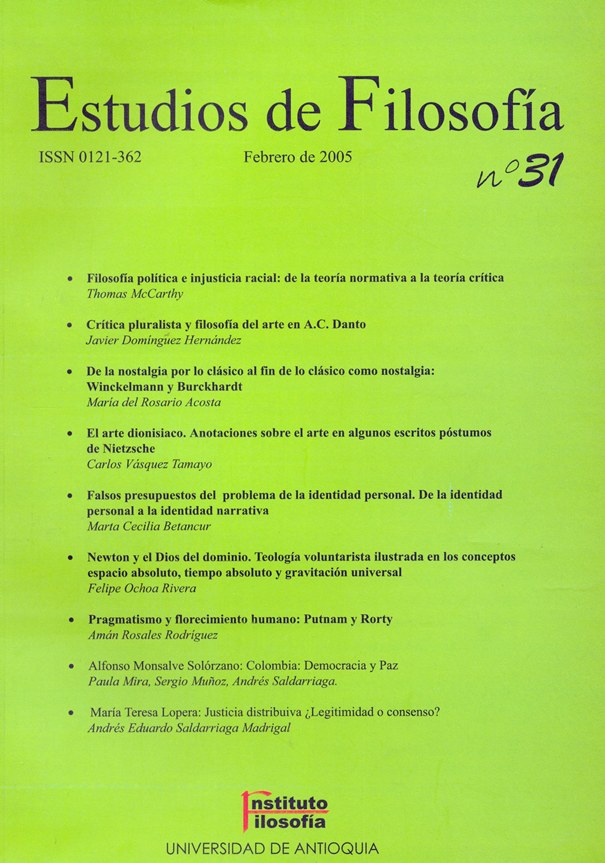From “Nostalgia for Classic” to “The End of Classic as Nostalgia”: Winckelmann and Burckhardt
DOI:
https://doi.org/10.17533/udea.ef.12851Keywords:
Winckelmann, Burckhardt, classic, nostalgia, aesthetics, philosophy ofhistoryAbstract
This text proposes to answer a question about the relation between Aesthetics and Philosophy of History as found in the Aesthetic Theories of Winckelmann (half of the XVIIIth Century) as opposed to Burckhardt's reflexions on History (end ofthe XIXth Century), and each ofthese is crossed by the meaning the concept of “classic” acquires in them. The idea is to show how a History of Art such as Winckelman's, whose criterion is Greek Art as canon, necessarily entails with it a Philosophy of History that supports it and makes it possible; at the same time, that a reflexion about History such as Burckhardt's, that presents itself as an answer to the Neo-classic tradition and to the Romantic tradition that comes right before it, displays behind it an Aesthetic Thought that is self-made.
Downloads
References
Assunto, R. La antigüedad comofuturo. Barcelona: Visor, 1990.
Berefelt, G. “The Regeneration Problem in German Neoclassicism and Romanticism”, en: The Journal of Aesthetics and Art Criticism. 1960, vol. 18, Nro4, pp. 475-481. DOI: https://doi.org/10.1111/1540_6245.jaac18.4.0475
Burckhardt, J. [1905]. Weltgeschichtliche Betrachtungen. Stuttgart: Alfred Kroner Verlag, 1949.
____________Reflexiones sobre la historia universal. Trad. Wenceslao Roces. México: FCE, 1996.
D’Angelo, P. La estética del Romanticismo. Madrid: Visor, 1999.
Gadamer, H. G. Verdad y Método I. Fundamentos de una hermenéutica filosófica. Salamanca: Sígueme, 2001.
Hegel, G. W. F. Lecciones sobre la estética. Trad. A. Brotóns Muñoz. Madrid: Akal, 1989.
Hölderlin, F. Sämtliche Werke und Briefe. München: Carl Hanser Verlag, 1970.
____________[1794-98]. Hyperion. Versiones previas. Trad. A. Ferrer. Madrid: Hiperión, 1982.
____________[1795]. “Proyecto”, en: Ensayos. Trad. F. Martínez Marzoa. Madrid: Hiperión, 1990, pp. 29-31.
____________Correspondencia completa. Trad. H. Cortés Gabaudán. Madrid: Hiperión, 1990.
Hume, D. [1777]. “On the Standard of Taste”, en: Miller, E. (ed.). Essays: Moral, Political and Literary. Indianapolis: Liberty Found, 1986.
Jauss, H. R. “Réplica a la querelle des anciens et des modernes”, en: La historia de la literatura como provocación. Madrid: Península, 2000.
Löwith, K. El sentido de la historia. Madrid: Aguilar, 1956.
Mannheim, K. “El pensamiento conservador”, en: Ensayos sobre sociología y psicología social. México: FCE, 1953.
Praz, M. Gusto neoclásico. Barcelona: Gustavo Gili, 1982.
Schiller, F. (1962) Schillers Werke. Nationalausgabe. Zwanzigste Band H. Koopmany B. von Wiese, (eds.). Weimar: Hermann Böhlaus, 1962.
____________ [1795]. Cartas sobre la educación estética del hombre. Trad. J. Feijoo. Barcelona: Anthropos, 1990.
____________ [1796]. Sobre poesía ingenua y sentimental. Trad. J. Probst y R. Lida. Barcelona: Icaria, 1982.
Szondi, P. Poética y filosofía de la historial. Madrid: Visor, 1992.
Taminiaux, J. “The Nostalgia for Greece at the Dawn of Classical Germany”, en: Poetics, Speculation and Judgment. NY: State University of NY Press, 1993.
Winckelmann, J. J. [1755]. “Reflexiones sobre la imitación del arte griego en la pintura y la escultura”, en: Belleza y verdad. Sobre la estética entre la Ilustración y el Romanticismo. Trad. V. Jarque Soriano. Barcelona: Alba.
____________ [1763]. Historia del arte en la antigüedad. Madrid: Aguilar, 1955.
Downloads
Published
How to Cite
Issue
Section
Categories
License
Copyright (c) 2005 María del Rosario Acosta

This work is licensed under a Creative Commons Attribution-NonCommercial-ShareAlike 4.0 International License.
Authors who publish with this journal agree to the following terms:
1. The Author retains copyright in the Work, where the term "Work" shall include all digital objects that may result in subsequent electronic publication or distribution.
2. Upon acceptance of the Work, the author shall grant to the Publisher the right of first publication of the Work.
3. The Author shall grant to the Publisher a nonexclusive perpetual right and license to publish, archive, and make accessible the Work in whole or in part in all forms of media now or hereafter known under a Creative Commons Attribution-NoCommercia-ShareAlike (CC BY-NC-SA 4.0), or its equivalent, which, for the avoidance of doubt, allows others to copy, distribute, and transmit the Work under the following conditions: (a) Attribution: Other users must attribute the Work in the manner specified by the author as indicated on the journal Web site;(b) Noncommercial: Other users (including Publisher) may not use this Work for commercial purposes;
4. The Author is able to enter into separate, additional contractual arrangements for the nonexclusive distribution of the journal's published version of the Work (e.g., post it to an institutional repository or publish it in a book), as long as there is provided in the document an acknowledgement of its initial publication in this journal;
5. Authors are permitted, and Estudios de Filosofía promotes, to post online the preprint manuscript of the Work in institutional repositories or on their Websites prior to and during the submission process, as it can lead to productive exchanges, as well as earlier and greater citation of published work (see The Effect of Open Access). Any such posting made before acceptance and publication of the Work is expected be updated upon publication to include a reference to the Estudios de Filosofía's assigned URL to the Article and its final published version in Estudios de Filosofía.















